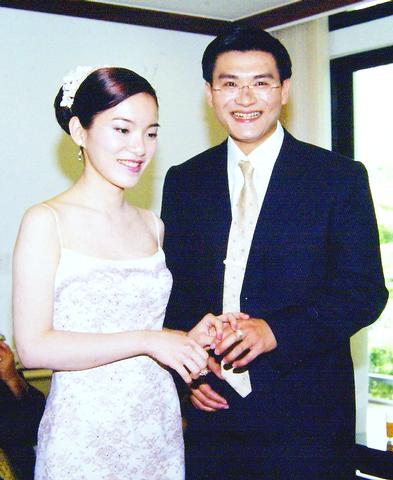President Chen Shui-bian's (
The traditional ceremony and banquet for the new couple was not open to the media. Therefore nearly 100 reporters gathered in front of the presidential residence to cover the whole event from a distance. Four members of the newly launched Next (壹周刊) magazine, however, pretended to be photographer's assistants in an attempt to enter the presidential residence, but were caught and ejected by security guards.

PHOTO: REUTERS
Chen Hsing-yu, 25, met Chao last October; when the couple were introduced to each other by Han I-hsiung (韓毅雄), a senior NTU Hospital doctor. They announced their intention to marry in April.
President Chen and his in-laws to be are all from Tainan County, a bastion of traditional standards in wedding and engagement ceremonies. As part of the tradition, the president's 70-year-old mother Chen Lee-shen (
The engagement ceremony began at around 10am, an auspicious hour according to the Chinese Lunar almanac, and was finished within one hour. The first family and Chao's relatives, about 50 people, then enjoyed a banquet prepared by the Asia Pacific Hotel's Chao Chou restaurant in Taipei.
The banquet, usually an opportunity for the bride's family to show off, was relatively modest -- a 12-course Cantonese meal for 50 guests at NT$1,500 (US$43) per person, according to the caterer.
President Chen personally instructed the caterer last week to change the original menu of the banquet and take off the usual delicacy -- shark fin soup, replacing it with oyster soup.
Soup made from the fins of sharks is a Chinese delicacy traditionally eaten on special occasions. But environmentalists warn that as so many sharks are being killed for soup, the fish could soon face extinction.
Earlier yesterday morning, four reporters from Next magazine drove a black Honda Accord in an attempt to mingle into the Chao family motorcade and enter the presidential residence. Security guards were suspicious after counting seven cars in the motorcade entering the compound, instead of the six they expected.
After checking the last car, the security guards rushed to check the previous cars, which were already in the compound. They found four people in the black Honda Accord, who were unable to produce identification. The four initially claimed that they had been sent by a wedding boutique company hired to take photos of the ceremony, according to the police. Police detained the four for questioning.
The four were identified as a reporter and two photographers from Next magazine and a driver. The first family has filed charges against the four, who face up to one year in prison if convicted of trespassing.
Later yesterday evening, the Presidential Office issued a press release expressing regret for the incident. The statement said that while the first family has tremendous respect for the freedom of the press, since the incident endangered security at the presidential residence, it was a matter for the presidential security detail to handle.
Pei Wei (裴偉), editor in chief of Next magazine, said that his reporters had no intention to trespass into the presidential residence. The reporters mistakenly thought the ceremony was open to outsiders when they saw the security guards beckoning them, Pei said.

DAREDEVIL: Honnold said it had always been a dream of his to climb Taipei 101, while a Netflix producer said the skyscraper was ‘a real icon of this country’ US climber Alex Honnold yesterday took on Taiwan’s tallest building, becoming the first person to scale Taipei 101 without a rope, harness or safety net. Hundreds of spectators gathered at the base of the 101-story skyscraper to watch Honnold, 40, embark on his daredevil feat, which was also broadcast live on Netflix. Dressed in a red T-shirt and yellow custom-made climbing shoes, Honnold swiftly moved up the southeast face of the glass and steel building. At one point, he stepped onto a platform midway up to wave down at fans and onlookers who were taking photos. People watching from inside

A Vietnamese migrant worker yesterday won NT$12 million (US$379,627) on a Lunar New Year scratch card in Kaohsiung as part of Taiwan Lottery Co’s (台灣彩券) “NT$12 Million Grand Fortune” (1200萬大吉利) game. The man was the first top-prize winner of the new game launched on Jan. 6 to mark the Lunar New Year. Three Vietnamese migrant workers visited a Taiwan Lottery shop on Xinyue Street in Kaohsiung’s Gangshan District (崗山), a store representative said. The player bought multiple tickets and, after winning nothing, held the final lottery ticket in one hand and rubbed the store’s statue of the Maitreya Buddha’s belly with the other,

‘COMMITTED TO DETERRENCE’: Washington would stand by its allies, but it can only help as much as countries help themselves, Raymond Greene said The US is committed to deterrence in the first island chain, but it should not bear the burden alone, as “freedom is not free,” American Institute in Taiwan Director Raymond Greene said in a speech at the Institute for National Defense and Security Research’s “Strengthening Resilience: Defense as the Engine of Development” seminar in Taipei yesterday. In the speech, titled “Investing Together and a Secure and Prosperous Future,” Greene highlighted the contributions of US President Donald Trump’s administration to Taiwan’s defense efforts, including the establishment of supply chains for drones and autonomous systems, offers of security assistance and the expansion of

Japan’s strategic alliance with the US would collapse if Tokyo were to turn away from a conflict in Taiwan, Japanese Prime Minister Sanae Takaichi said yesterday, but distanced herself from previous comments that suggested a possible military response in such an event. Takaichi expressed her latest views on a nationally broadcast TV program late on Monday, where an opposition party leader criticized her for igniting tensions with China with the earlier remarks. Ties between Japan and China have sunk to the worst level in years after Takaichi said in November that a hypothetical Chinese attack on Taiwan could bring about a Japanese